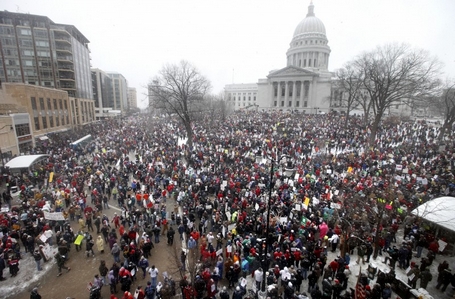Was Act 10 Necessary?
Nine years ago today Act 10 was signed by Gov. Walker. This classic column exploded the myths about the union-crushing law.
Few people can claim to have two state government commissions named after them. Donald Kettl can. Kettl was appointed in 1996 by Governor Tommy Thompson to serve as chair of a Blue Ribbon Commission on Campaign Finance Reform. In 1999, he was again asked by Thompson to head up a Blue-Ribbon Commission on State-Local Partnerships for the 21st Century. Both were bipartisan commissions whose findings were often cited as those of the “Kettl commission.”
Kettl was then a professor at UW-Madison and is now at the University of Maryland School of Public Policy. He has a resume that doesn’t quit, including writing books about politics and government, consulting for various federal departments and writing a column for Governing magazine, “Potomac Chronicle.” So it’s of considerable interest that Kettl has written a long, wonky feature for the Washington Monthly, entitled “Scott Walker’s Real Legacy,” that looks at the rationale for Act 10, which largely eliminated public employee unions, and what that also might tell us about Walker as president.
Kettle examines each of Walker’s justifications for Act 10. For starters, as Walker told Fox News’ Chris Wallace at the time. “We’ve got a $3.6 billion budget deficit. We are broke.” Closing that deficit can’t be done, he insisted, “with the current collective bargaining laws.”
But Kettl notes two studies, one by George Washington University political scientist John Sides which found that states with larger unionized workforces do not have larger budget deficits. “A follow-up study by… the University of California, Berkeley, added collective bargaining to Sides’s calculations and got the same result: states where unions had strong collective bargaining rights did not have bigger deficits than states without such protections.”
In fact, Kettl notes, “other states also closed large budget deficits” in 2011 without crushing public unions. “Some, like Connecticut and Rhode Island, did so by winning large labor concessions, but through old-fashioned hard bargaining…. Indeed, early in the negotiating process with Walker, union leaders said they would concede to his demands for higher employee contributions to pensions and health care if he would drop his insistence on gutting collective bargaining.”
Thus, if Walker’s goal was to equalize private and public compensation, he should have targeted less educated employees. “The jobs of police and fire fighters have entry requirements of a high school education, compared with at least a bachelor’s degree for teachers,” Kettl notes. “But the firefighters and police officers were exempt, while teachers took the brunt.”
Kettl concedes that Wisconsin’s teachers’ unions were “especially successful in getting many districts to pay the teachers’ share of contributions to the state pension system, to the tune of more than 6 percent of their salaries.” But he notes various studies which show that “many other factors besides union bargaining determine teachers’ salaries, and they often count much more.”
Kettle notes Walker’s other justification for targeting teachers unions is because without seniority and tenure, districts “can hire and fire based on merit” and “pay based on performance.” But Kettl compares the strength of teachers unions in states as determined by the conservative Thomas Fordham Institute and the K-12 achievement results “as ranked by Education Week in its annual survey” and finds little relationship between weaker unions and higher achievement.
Kettl also notes that “not a nickel” of the $3 billion Walker saved by reducing employee benefits went to shore up the state’s pension fund, because “he inherited the nation’s strongest state pension system, with 99.8 percent of its obligations funded.” Indeed, Kettl notes, studies also show there is no correlation between the strength of public sector unions and underfunded state pensions. “It turns out that elected leaders, regardless of their state or party, are good at finding ways to underfund their pension systems, since doing so takes pressure off today’s budget while pushing the pain off into the future.”
So if the policy reasons for crushing public unions don’t hold up, why did Walker insist on this? Here, Kettl, who knows Wisconsin well, and was Mr. Bipartisan policy wonk here, notes the influence of the 1998 race for state senator which decided which party would control the senate, and was won by Democrat Jon Erpenbach. The race became a battle between the campaign coffers of the state teachers union, WEAC, and the Wisconsin Manufacturers and Commerce, and WEAC won. After that, he notes, “the fight between WEAC and the WMC became a blood feud,” and when the Republicans swept the governorship and both houses of the Legislature in 2010, the stage was set for the Republicans to deliver “a knockout blow to WEAC.”
Kettl overlooks some abuses of government benefits in Wisconsin, notably the obscene Milwaukee County pension plan, but the county is not part of the state system. And in any event, as he notes, reductions in compensation of public workers could easily have been achieved without eliminating collective bargaining rights.
As I wrote, back when Act 10 was proposed, Gov. Thompson had greatly reduced teacher compensation by passing school cost controls and eliminating compulsory mediation arbitration for teacher contracts, which resulted in teacher salaries dropping from near the top among states to a rank of 23rd, with salaries at 93 percent of the average nationally. Thompson did this at a time of divided government. With control of both houses of the Legislature, Walker could have instituted any number of state changes to drive down compensation without eliminating unions. Walker’s real goal was to kill the prime funder of democratic campaigns, WEAC and other public employee unions, while protecting the public safety unions that typically support Republicans.
If anything, Kettl contends, “the biggest problem with federal employees is that there’s not nearly enough of them… the size of the federal workforce today remains about what it was in 1960. Meanwhile, the U.S. population has more than doubled, the federal budget has quadrupled in real terms, and the number of pages in the Federal Register has grown fivefold.” As a result the federal government has relied instead on outside contractors, and “year after year the GAO and other watchdogs document countless programmatic breakdowns and billions of dollars in cost overruns.” The “egregious backlogs for appointments at some Veterans Affairs hospitals” is just one of the many problems caused “by too few federal employees,” he notes.
In Wisconsin, meanwhile, we now have a proposal to reduce the requirements for teachers to just a high school diploma for some courses. It’s a sign that there is a shortage of teachers in the state. At UW-Milwaukee, the campus is losing talented faculty and the federal research dollars they attract, and that was before the move to eliminate tenure. The reality is that Wisconsin is not an island and talented teachers and professors can look for jobs beyond its borders. The long-term impact of the Walker revolution on the state’s education system and economy is worrisome, but at least open to argument. The impact of Act 10 on the Democratic Party and chief funders, however, is crystal clear: they’ve been decimated.
Originally published as a “Murphy’s Law” column on June 16, 2015.
If you think stories like this are important, become a member of Urban Milwaukee and help support real, independent journalism. Plus you get some cool added benefits.
More about the ACT 10
- Susan Crawford Attempted to Overturn Act 10 - Brad Schimel - Feb 26th, 2025
- Despite Act 10, Union Argues UW Health Nurses Can Collectively Bargain - Rich Kremer - Feb 13th, 2025
- Protasiewicz Says She Won’t Recuse From Act 10 Case - Anya van Wagtendonk - Feb 13th, 2025
- Unions: We Remain Confident in Merits of Our Case - Wisconsin Education Association Council - Feb 12th, 2025
- Supreme Court Justice Brian Hagedorn Recuses Himself From Act 10 Challenge - Rich Kremer - Jan 31st, 2025
- Republicans Push Justice Protasiewicz to Recuse From Act 10 Case - Anya van Wagtendonk - Jan 29th, 2025
- Ruling That Struck Down Act 10 Put on Hold - Rich Kremer - Dec 20th, 2024
- Data Wonk: Did Act 10 Improve Wisconsin’s Economy? - Bruce Thompson - Dec 12th, 2024
- Op Ed: Republicans Behind the Times on Act 10 - Ruth Conniff - Dec 11th, 2024
- Murphy’s Law: Act 10 Ruling Could Be Tough to Overturn - Bruce Murphy - Dec 9th, 2024
Read more about ACT 10 here
Murphy's Law
-
Top Health Care Exec Paid $25.7 Million
 Dec 16th, 2025 by Bruce Murphy
Dec 16th, 2025 by Bruce Murphy
-
Milwaukee Mayor’s Power in Decline?
 Dec 10th, 2025 by Bruce Murphy
Dec 10th, 2025 by Bruce Murphy
-
Total Cost of Foxconn Is Rising
 Dec 8th, 2025 by Bruce Murphy
Dec 8th, 2025 by Bruce Murphy






















If Illinois was smart they would pass their own version of act 10 before the public employee unions push them into insolvency